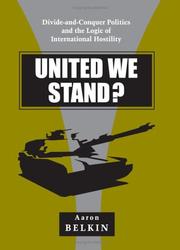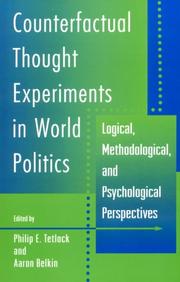| Listing 1 - 6 of 6 |
Sort by
|

ISBN: 0791483789 1423743784 9781423743781 0791463435 9780791463437 9780791483787 Year: 2005 Publisher: Albany : State University of New York Press,
Abstract | Keywords | Export | Availability | Bookmark
 Loading...
Loading...Choose an application
- Reference Manager
- EndNote
- RefWorks (Direct export to RefWorks)
It has long been assumed that leaders engage in international conflict to unify their followers—what is often called the "rally 'round the flag" hypothesis. Despite its intuitive appeal, however, this hypothesis does not always provide a compelling explanation of the relationship between domestic politics and international conflict. In United We Stand? Aaron Belkin shows that in one important realm, civil-military relations, leaders often prefer divisiveness over cohesion. When they feel domestically vulnerable, leaders use international conflict in order to create and exacerbate rivalries among their own military forces to lower the risk of a coup and to contribute to the consolidation and stability of the political order. Case studies include post-Soviet Georgia and Syria.
World politics. --- Conflict management. --- International relations. --- Colonialism --- Global politics --- International politics --- Political history --- Political science --- World history --- Eastern question --- Geopolitics --- International organization --- International relations --- Conflict control --- Conflict resolution --- Dispute settlement --- Management of conflict --- Managing conflict --- Management --- Negotiation --- Problem solving --- Social conflict --- Crisis management --- Coexistence --- Foreign affairs --- Foreign policy --- Foreign relations --- Global governance --- Interdependence of nations --- International affairs --- Peaceful coexistence --- World order --- National security --- Sovereignty --- World politics
Book
ISBN: 9780231702843 Year: 2012 Publisher: New York Columbia University Press
Abstract | Keywords | Export | Availability | Bookmark
 Loading...
Loading...Choose an application
- Reference Manager
- EndNote
- RefWorks (Direct export to RefWorks)

ISBN: 0691027919 0691027927 0691215073 Year: 1996 Publisher: Princeton, N.J. : Princeton University Press,
Abstract | Keywords | Export | Availability | Bookmark
 Loading...
Loading...Choose an application
- Reference Manager
- EndNote
- RefWorks (Direct export to RefWorks)
Political scientists often ask themselves what might have been if history had unfolded differently: if Stalin had been ousted as General Party Secretary or if the United States had not dropped the bomb on Japan. Although scholars sometimes scoff at applying hypothetical reasoning to world politics, the contributors to this volume--including James Fearon, Richard Lebow, Margaret Levi, Bruce Russett, and Barry Weingast--find such counterfactual conjectures not only useful, but necessary for drawing causal inferences from historical data. Given the importance of counterfactuals, it is perhaps surprising that we lack standards for evaluating them. To fill this gap, Philip Tetlock and Aaron Belkin propose a set of criteria for distinguishing plausible from implausible counterfactual conjectures across a wide range of applications. The contributors to this volume make use of these and other criteria to evaluate counterfactuals that emerge in diverse methodological contexts including comparative case studies, game theory, and statistical analysis. Taken together, these essays go a long way toward establishing a more nuanced and rigorous framework for assessing counterfactual arguments about world politics in particular and about the social sciences more broadly.
International relations. Foreign policy --- Methods in social research (general) --- History as a science --- World politics. --- History --- Counterfactuals (Logic) --- Thought experiments. --- Philosophy. --- World politics --- -Counterfactuals (Logic) --- Thought experiments --- #SBIB:327H03 --- #SBIB:327.1H10 --- Experiments, Thought --- Methodology --- Contrary-to-fact conditional --- Counterfactual conditionals --- Conditionals (Logic) --- Logic --- Annals --- Auxiliary sciences of history --- Colonialism --- Global politics --- International politics --- Political history --- Political science --- World history --- Eastern question --- Geopolitics --- International organization --- International relations --- Philosophy --- Internationale betrekkingen: onderwijs en onderzoek --- Internationale betrekkingen: theorieën --- Counterfactuals (Logic). --- History, Modern --- Gedankenexperiment --- Internationale Politik --- Weltpolitik --- Azerbaijan crisis. --- Bay of Pigs. --- Goldstone, Jack. --- Halifax, Lord. --- Iranian revolution. --- Jowitt, Ken. --- Khrushchev, N. --- Leninism. --- Napoleon. --- Nash equilibrium. --- Qavam. --- Riser, E. --- Russian revolution. --- Stalinism. --- Thucydides. --- data scarcity. --- experimental method. --- hindsight. --- legitimacy issues. --- moral catastrophes. --- nomothetic counterfactuals. --- optimality constraints. --- perfect equilibrium. --- policy makers. --- proximity criterion. --- reification. --- structuralism. --- tripolar world. --- Politique mondiale --- Histoire --- Contrefactuel (logique) --- Pensée --- philosophie --- expériences --- Weltordnungspolitik --- Politik --- Internationale Beziehungen --- Politische Beziehungen --- Zwischenstaatliche Beziehungen --- Außenpolitik --- Internationales politisches System --- Experiment --- Pensée --- expériences
Book
ISBN: 9781685853358 Year: 2022 Publisher: Boulder
Abstract | Keywords | Export | Availability | Bookmark
 Loading...
Loading...Choose an application
- Reference Manager
- EndNote
- RefWorks (Direct export to RefWorks)
Book

ISBN: 9781685851668 1685851665 Year: 2023 Publisher: Boulder
Abstract | Keywords | Export | Availability | Bookmark
 Loading...
Loading...Choose an application
- Reference Manager
- EndNote
- RefWorks (Direct export to RefWorks)
Pointing to the dramatic changes in Soviet policy in Latin America over the past few years, the authors demonstrate that the fear of Soviet penetration of the region, which drove US policy during the Cold War, has become groundless. Although not ignoring the continuing tensions between Cuba and the US, they argue that it is time for the US to adapt its Latin America policy to the post-Cold War Era.
Book

ISBN: 9780691215075 Year: 2020 Publisher: Princeton, NJ
Abstract | Keywords | Export | Availability | Bookmark
 Loading...
Loading...Choose an application
- Reference Manager
- EndNote
- RefWorks (Direct export to RefWorks)
| Listing 1 - 6 of 6 |
Sort by
|

 Search
Search Feedback
Feedback About UniCat
About UniCat  Help
Help News
News